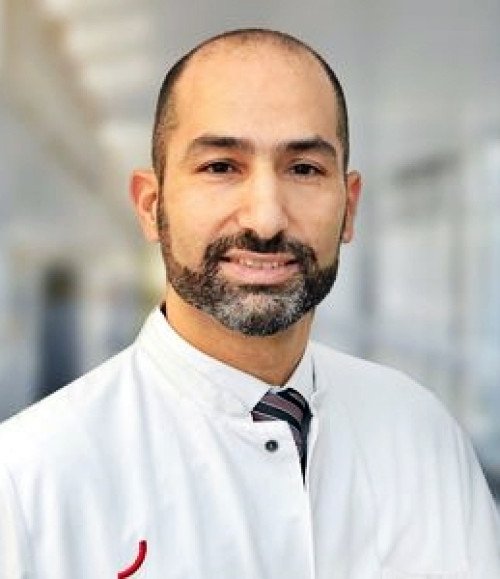Nephrologists (neh-frah-leh-jists) are medical professionals who specialize in kidney care. The urinary system includes your kidneys. Your body excretes waste, excess water, and electrolytes as urine, which is filtered by these bean-shaped organs.
Core Functions
1. Comprehensive Diagnostics
A successful course of therapy requires a clear diagnosis. The Department of Nephrology evaluates kidney function and pinpoints underlying diseases using advanced diagnostic technologies. This includes imaging tests like ultrasound and CT scans, urine tests to find protein or blood, blood tests to assess creatinine and blood urea nitrogen (BUN) levels, and kidney biopsies to look at tissue samples. Nephrologists may create accurate treatment programs that are suited to the individual requirements of each patient with the use of these diagnostic method.
2. Advanced Treatments and Therapies
Treatments for a variety of kidney diseases, such as polycystic kidney disease (PKD), glomerulonephritis, acute kidney injury (AKI), nephrotic syndrome, and chronic kidney disease (CKD), are provided by the Department of Nephrology. Dialysis is used to remove waste from the blood, blood pressure drugs are used to lower proteinuria, and kidney transplants are used to treat end-stage renal disease (ESRD). The department's objectives are to reduce kidney disease's rate of progression, manage symptoms, and enhance patients' quality of life.
3. Dialysis Services
Dialysis is a life-saving procedure for those with severe renal disease. Options for both hemodialysis and peritoneal dialysis are offered by the Department of Nephrology. Whereas peritoneal dialysis utilizes the lining of the abdomen to filter blood within the body, hemodialysis employs a machine to filter waste and extra fluid from the blood. For safe and efficient treatment, the department's dialysis units have the latest technology and are served by skilled medical professionals.
4. Kidney Transplantation
Patients with end-stage renal illness typically have kidney transplantation as their best choice. To offer complete Treatment in germany before to, during, and after transplantation, the Department of Nephrology collaborates closely with immunologists, transplant surgeons, and other experts.
The transplant team helps patients discover appropriate donors, get ready for surgery, and take care of their post-transplant needs, which includes taking immunosuppressive drugs to avoid rejection. This method brings together experts from different fields to improve the chances of a good transfer and long-term kidney function.
5. Patient Guidance and Assistance
Informing patients about their disease and available treatments is an essential component of nephrology care. Many resources are available from the Department of Nephrology, including instructional materials, support groups, and individual counseling.
Patients gain knowledge on how to maintain better general health and preserve kidney function by controlling their food, medicines, and lifestyle. Giving patient’s information empowers them to take charge of their treatment and make wise choices.
Common Kidney Conditions and Treatments
1. Chronic Kidney Disease (CKD)
The long-term disease known as chronic kidney disease (CKD) causes the kidneys to gradually quit functioning. The goal of the Department of Nephrology is to delay the course of the illness by focusing on early identification and treatments.
Reducing protein consumption, addressing consequences including anemia and bone damage, and regulating blood pressure and blood sugar are all part of the treatment. Treatment plan adjustments and routine monitoring are crucial to maintain kidney function and prevent end-stage renal disease (ESRD).
2. Acute Kidney Injury (AKI)
Unexpected loss of kidney function, or AKI, is often brought on by infections, dehydration, or drug side effects. Timely diagnosis and treatment are necessary to avoid permanent damage. Aggressive therapy of underlying causes, fluid and electrolyte balance, and, if required, temporary dialysis are all provided by the Department of Nephrology. Many individuals are helped to return to normal kidney function with early intervention and supportive treatment.
3. Glomerulonephritis
The inflammation of the glomeruli, the kidney's filtering units, may cause kidney damage and is known as glomerulonephritis. Medication to suppress the immune system, regulate blood pressure, and lessen proteinuria may be part of the treatment, which is dependent on the etiology and severity of the illness. To determine the underlying reason and customize therapy for each patient, the Department of Nephrology performs comprehensive assessments.
4. Nephrotic Syndrome
High urine protein levels, low blood protein levels, edema, and high cholesterol levels are the main symptoms of nephrotic syndrome. The Department of Nephrology Offers treatment for nephrotic syndrome with medications to reduce proteinuria, manage blood pressure, and control cholesterol levels.
Dietary changes and diuretics may also be recommended to reduce swelling. Ongoing monitoring and adjustments to the treatment plan are essential for managing this condition.
5. Polycystic Kidney Disease (PKD)
PKD is a genetic disorder that causes cysts to form in the kidneys, leading to enlargement and loss of function. The Department of Nephrology provides comprehensive care for PKD patients, including blood pressure management, pain relief, and treatment of complications such as infections and kidney stones.
Regular monitoring and lifestyle modifications can help slow the progression of the disease and maintain kidney function.
Advancements and Research
1. Cutting-Edge Research
Utilizing cutting-edge methods to progress the field is the Department of Nephrology's mission. The goals of clinical trials and research are to better understand the underlying causes of kidney disorders, create novel medicines, and enhance current medications. To improve patient outcomes and quality of life, research efforts are focused on developing more effective methods for kidney disease diagnosis, treatment, and prevention.
2. Advanced Technology
The department improves patient care by using modern technologies. This comprises modern dialysis equipment for effective treatment, high-resolution imaging for precise diagnosis, and telemedicine systems for remote monitoring and consultation.
The Department of Nephrology uses the most recent developments in medical technology to guarantee that patients get the best treatment possible by embracing innovation.
3. Personalized Medicine
The new field of personalized medicine adjusts a patient's course of care to suit their particular genetic profile and traits. Utilizing genetic tests and biomarkers to create customized treatment regimens, the Department of Nephrology incorporates personalized medicine into patient care. Better patient results result from this method's increased therapeutic efficacy and decreased likelihood of side effects.
Patient-Centered Care
1. Holistic Approach
The Department of Nephrology takes a holistic approach to patient care, addressing not only the physical aspects of kidney disease but also the emotional, social, and psychological factors. This comprehensive care model ensures that patients receive support in all areas of their lives, promoting overall well-being and quality of life.
2. Multidisciplinary Team
The department's multidisciplinary team includes nephrologists, transplant surgeons, dietitians, social workers, and nursing staff. Regular team meetings and coordinated care plans ensure seamless communication and continuity of care.
3. Supportive Environment
The Department of Nephrology provides a supportive environment where patients feel cared for and understood. This includes compassionate care from dedicated healthcare professionals, access to support groups and counseling services, and a focus on patient education and empowerment.
Creating a positive and supportive atmosphere helps patients cope with their condition and achieve better outcomes.
The Department of Nephrology treats a wide range of kidney-related conditions, including chronic kidney disease (CKD), acute kidney injury (AKI), glomerulonephritis, nephrotic syndrome, polycystic kidney disease (PKD), and end-stage renal disease (ESRD). The department also manages complications associated with these conditions, such as hypertension, anemia, and electrolyte imbalances. Additionally, the department provides dialysis services and kidney transplantation for patients with advanced kidney disease.
During your first visit, a nephrologist will conduct a thorough evaluation of your medical history, symptoms, and current health status. This may include discussing any previous kidney-related issues, medications, and lifestyle factors. A physical examination will be performed, and diagnostic tests such as blood and urine tests, imaging studies, or a kidney biopsy may be ordered to assess kidney function and identify underlying conditions. Based on the results, the nephrologist will develop a personalized treatment plan tailored to your specific needs.
Management of CKD in the Department of Nephrology focuses on slowing disease progression, managing symptoms, and preventing complications. Treatment includes controlling blood pressure and blood sugar, reducing protein intake, and using medications to manage associated conditions like anemia and bone disease. Regular monitoring and follow-up appointments are essential to adjust the treatment plan as needed. Lifestyle changes, such as adopting a kidney-friendly diet and maintaining a healthy weight, are also crucial components of CKD management.
The Department of Nephrology offers two main types of dialysis: hemodialysis and peritoneal dialysis. Hemodialysis uses a machine to filter waste and excess fluids from the blood, typically performed at a dialysis center. Peritoneal dialysis involves using the lining of the abdomen (peritoneum) to filter blood inside the body, which can often be done at home. The nephrologist will discuss the pros and cons of each method and help determine the best option based on the patient's condition, lifestyle, and preferences.
The kidney transplantation process involves several steps, starting with a comprehensive evaluation to determine if the patient is a suitable candidate for transplantation. This includes medical assessments, psychological evaluations, and compatibility testing with potential donors. Once a donor match is found, the patient undergoes surgery to receive the donor kidney. Post-transplant care includes regular follow-up appointments, immunosuppressive medications to prevent rejection, and monitoring for complications. The Department of Nephrology works closely with transplant surgeons and a multidisciplinary team to provide comprehensive care throughout the entire process.
Experience the difference that expertise and compassion can make. Meet our exceptional team of experienced doctors, and trust us to provide you with the best in healthcare.


Nephrology
Chief Physician: Department of Internal Medicine Nephrology
Berlin

Nephrology
Specialist in Internal Medicine with a Focus on Endocrinology and Nephrology
Berlin

Nephrology
Director of the Department of Internal Medicine III, Specialist in Nephrology, Diabetologist
Jena

.webp)
 (1).webp)

.webp)
 (1).webp)


.webp)
 (1).webp)

.webp)
 (1).webp)
